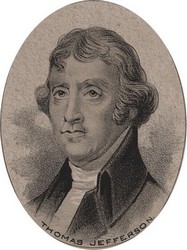Thomas Jefferson And Education
|
| updated |
Copy Link Code
|
 As the founder of the University of Virginia and an early proponent of publicly funded schools, Thomas Jefferson instilled a legacy of self-improvement through education that has remained central to the American dream. The author of the Declaration of Independence and third President of the United States recognized the vital importance of advanced education for the citizenry of a democratic republic. During the Constitutional Convention of 1787, Jefferson was serving as Minister to France but imposed his influence through letters, many of which contained pleas for legislative support of public education. His ideals for a secular education based on science and philosophy were revolutionary in a time when almost all academics were based around the theology of priestly orders and religious sects. In the letters after his presidency and before the establishment of the University of Virginia, Jefferson is adamant in his position that an educated public is necessary for the safety of liberty and that an ignorant society is doomed to fail.
As the founder of the University of Virginia and an early proponent of publicly funded schools, Thomas Jefferson instilled a legacy of self-improvement through education that has remained central to the American dream. The author of the Declaration of Independence and third President of the United States recognized the vital importance of advanced education for the citizenry of a democratic republic. During the Constitutional Convention of 1787, Jefferson was serving as Minister to France but imposed his influence through letters, many of which contained pleas for legislative support of public education. His ideals for a secular education based on science and philosophy were revolutionary in a time when almost all academics were based around the theology of priestly orders and religious sects. In the letters after his presidency and before the establishment of the University of Virginia, Jefferson is adamant in his position that an educated public is necessary for the safety of liberty and that an ignorant society is doomed to fail.
The ideals of Thomas Jefferson and education policies of the early United States demonstrate the deeper influence of Enlightenment philosophies. For much of Thomas Jefferson's education at the College of William & Mary, reading included the works of British Empiricists such as John Locke, Francis Bacon and Isaac Newton. Jefferson entered the College at 16 and immediately gained recognition for his eagerness and capacity to master multiple subjects. It was here that the young Jefferson first pondered the theology of Deism which found evidence of a divine creator through sciences and the natural order but rejected the concept of divine interventionism. At the time, students at European and colonial universities had only three options as a focus of study: medicine, law, and theology. Jefferson pursued a career as a lawyer but was quickly drawn into the world of Virginia politics and subsequently, the Revolution. When he was asked to head the drafting committee for the Declaration of Independence, Jefferson drew on the lessons of Locke and the Enlightenment thinkers who valued the natural rights of liberty.
In 1819, the Virginia House of Burgesses officially chartered a public university to be operated under the direction of Thomas Jefferson. With the greatest of care for a new, secular ideal, Jefferson set about designing the "Academical Village" of the University of Virginia. Instead of revolving around a church like most contemporary schools, the University of Virginia was built around a magnificent library that is now known as the Rotunda. In fact, Jefferson did not plan for a chapel to be included anywhere on campus. In the earlier writing of Thomas Jefferson on education, he had outlined his ideal for a new structure of university that did not involve a selected theology and instead allowed for elective studies of multiple subjects. The University of Virginia offered majors unlike any other college at the time, including Astronomy, Architecture, Botany, Philosophy and Political Science. Jefferson's impact on American education can not be overstated; his adamant support for public education set a standard that resonates strongly today.
